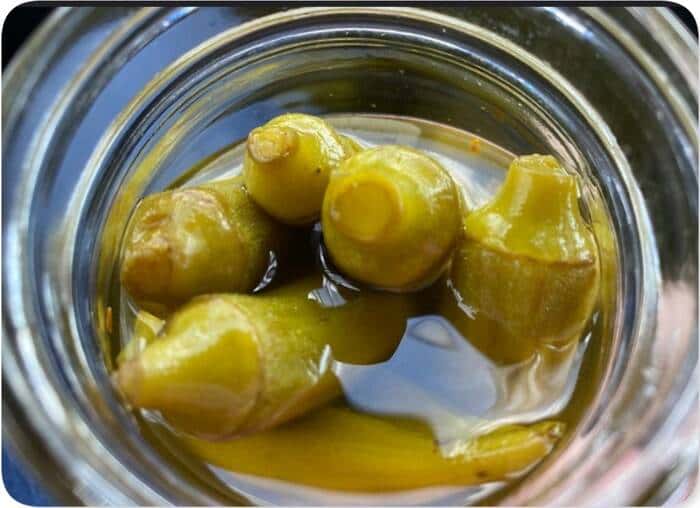Here are the pickled okra recipes, with these three variations. A very simple recipe to make and does not require much time to prepare. In addition, the okra keeps all its benefits for a long time. Take advantage of this generous vegetable, which will only be good for your health!
I. What is Okra
Okra is a vegetable most commonly found in India and Africa. Also known as okra, it is one of the most vitamin C-rich vegetables.
It is often used in cooking as a condiment to prepare appetizing dishes.
This vegetable, mainly known for its usefulness in cooking, also has incredible health benefits for the whole body.
II. Pickled Okra Recipes
1. Simple Recipe
To prepare pickled okra, you need to make sure to follow a fairly simple set of instructions.
First, bring water to a boil in a saucepan and place the jars and lids in which the okra will be stored.
Then let it boil for 10 minutes to sterilize them, and remove the jars and their lids with a pair of tongs and place them on a clean cloth.
The second step is to select the best okra. They must be tender, small, and above all fresh.
After selecting them, you will need to rinse and clean them, before cutting off the stem end of the okra. Then make sure to keep the rest of the body of the okra whole.
Thirdly, you will have to cut lemon slices and put them in different jars. Then add the okra.
It is also important to make sure that the okra is placed vertically so that the sliced part is at the opening.
For the fourth step, you will need to put water and cider vinegar in a saucepan and add salt before bringing everything to a boil.
Let it boil for about 5 minutes and then pour the total solution into the different jars, before closing them hermetically.
Finally, you can boil the jars for another 10 minutes in the water used for sterilization and then let them cool for 12 to 24 hours.
It will then be necessary to wait for 1 to 6 weeks before being able to use them for consumption.

2. Spicy pickled okra recipes
To prepare spicy pickled okra, simply follow the same recipe as the simple pickled okra.
Except that for the spicy pickled okra recipe, after selecting the okra, you need to mix the spices (mustard seeds, coriander, a bit of black pepper, cloves, and a few bay leaves) in a pan over low heat until they become lightly browned.
Then, you will only have to pour the solution into the jars and follow the other steps of the preparation.
3. Sweet pickled okra recipes
For sweet pickled okra, it’s easier to make. You have to follow the preparation steps of the simple pickled okra.
But in the fourth step, you simply add sugar to the solution, before bringing it to a boil.
About 4 teaspoons will be needed. Then let it boil for 5 minutes, before pouring it into the different jars.
III. Health benefits of okra
1. May strengthen the immune system
Okra is food containing many nutrients, and these nutrients participate in the proper functioning of the immune system.
Among these nutrients, we can note vitamin C, which stimulates the creation of white blood cells, copper which protects against oxidative stress, and many others.
2. Control of blood sugar level
For diabetics, okra is a food of choice. It has a low glycemic index, and many studies have proven that its action would have a certain effect on the level of sugar in the blood.
3. May improve cognitive health
Okra also plays a fairly important role in brain health. It helps to alleviate the effects of old age on the brain and is also helpful in fighting brain cancers.
4. Can help maintain heart health
Consuming okra reduces the risk of heart disease. Indeed, by its action on cholesterol, okra protects the body from all kinds of heart diseases.
5. May help prevent cancer
Okra is great for your health. In fact, in addition to strengthening the immune system and being excellent for the brain, okra is also useful in fighting certain cancers.
It is rich in antioxidants, an element that helps fight free radicals, which are sometimes the cause of certain cancers.
6. May improve digestion
Okra is also useful to ensure the proper functioning of the digestive system. It facilitates intestinal transit and fights against constipation.
7. May safeguard the solidity of the bones
Okra is also excellent for bone health. It is rich in calcium, a mineral that is essential for the formation, strength, and growth of bones.
8. May help control cholesterol levels
Okra also helps regulate cholesterol levels. According to some studies, its consumption would result in a decrease in the cholesterol level in the body.
9. May help hair and scalp health
Free radicals are also the main culprits of harmful effects on hair. They are the cause of many scalp ailments.
To remedy this, you can use okra. Rich in antioxidants and vitamin C, it helps neutralize free radicals and revitalize hair.
10. May heal ulcers
Okra is also useful for healing ulcers. According to some research, its consumption helps, accelerates, and facilitates the healing of ulcers.
11. May help reduce the effects of asthma
Asthma is a disease related to increased oxidative stress. This stress is the result of an excess of free radicals in the body.
Free radicals are neutralized by antioxidants; which okra contains in substantial quantities.

IV. Other Questions about pickled okra recipes
1. How long does it take for okra to pickle?
As mentioned in this article, it takes about 1-6 weeks for the okra to be fully marinated.
At this point, the okra begins to soften, and eating it becomes a real treat.
2. How should you store pickled okra?
It is possible to store okra in different ways. When using the simple recipe, you can store the jars of okra in a dark place where the temperature is between 0 and 25 degrees.
If there is not much temperature variation, the pickled okra can stay that way for 3 years without going bad.
However, it is important to make sure that the jars are completely sealed. Nothing should be able to penetrate them, not even air.
When adding certain vegetables such as carrots, tomatoes, eggplant, or peppers, it is preferable to store the pickled okra in a place where the temperature is relatively low.
It can be a cellar or a refrigerator. It is recommended to use the refrigerator as this is a much safer option.
And it is also important to note that a jar of pickled okra that has been opened should not be left in a cold place for more than 3 days.
3. Can I use frozen okra for canning?
For preserving okra, you can also use the freezing method.
But when it comes to preserving okra in jars, it is recommended to use fresh okra instead. It is much more effective.
4. Which is better for pickled okra, white vinegar, or cider vinegar?
For pickled okra, white vinegar is best. Cider vinegar is indeed used by most people.
However, white vinegar has an acidity of over 5%. This indeed makes it better for pickled okra.
5. Do we have to refrigerate pickled okra?
Not necessarily.
You can store it in a cold place, but it is most important to make sure that the jar in which the pickled okra is stored is tightly closed.
If not, it may give a rather unpleasant taste to your pickled okra recipe.
6. How to choose the right okra for pickling?
Pickled okra must meet three criteria. First of all, it must be tender. Second, it should be small, but most importantly, it should be as fresh as possible.
If you have the opportunity, try to select okra between 6 and 12 hours after harvest.
7. How can I use pickled okra?
You can use pickled okra in preparation as a salad. It is also possible to consume them unaccompanied as most people tend to do with pickles.
8. What Makes Pickled Okra Slimy?
Pickled okra is slimy simply because okra contains a gum called mucilaginous.
This gum, often used in cooking to thicken dishes (stews, soups, etc.) swells when it comes into contact with water and eventually produces a thick, viscous substance, hence the viscosity found in pickled okra recipes.
Useful Links:
Abelmoschus esculentus (L.): Bioactive Components’ Beneficial Properties
Nutritional response of okra to various packaging materials and chemical pickling agents